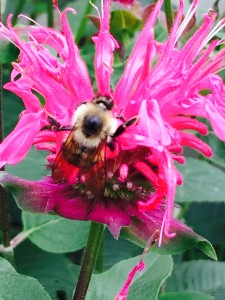Hello Fellow Readers,
There’s quite a buzz about widely-used insecticides impacting our pollinators. One out of every three bites of food depend on a pollinator; hence they are critical to our food supply. Digging through research, there are varying opinions on the effect of insecticides; though the statistics of the declining populations of pollinators is staggering. The Pollinator Partnership, the largest non-profit organization in the world dedicated to the protection of pollinators, states the U.S. has lost over 50 percent of its managed honeybee colonies in the past 10 years. And it was about 10 years ago when clothianidin and thiamethoxam, in the nitro group of neonicotinoid insecticides, first came into heavy use. Coincidence? I don’t think so. Neither does the European Union (EU) which includes Austria, Finland, France, Germany, Ireland, Italy, Portugal, Spain, Sweden amongst many others including the UK (in the EU at the time) and a few non-European countries – all who restricted the use of certain neonicotinoids since 2013. Yet Wikipedia reports “as of 2013 neonicotinoids have been used in the U.S. on about 95 percent of corn and canola crops, the majority of cotton, sorghum, and sugar beets and about half of all soybeans. They have been used on the vast majority of fruit and vegetables, including cereal grains, rice, nuts, and wine grapes.”
Recently, while scouting out seeds, I found suppliers that tout non-GMO (not genetically modified) and neonicotinoid-free. I didn’t realize seeds themselves can be coated with neonicotinoids which then spreads through the entire plant including the nectar hence impacting pollinators.

Ruth’s Happy Bumble Bee, Hope NJ
There’s legislation underway called the Saving America’s Pollinator Act of 2015 (HR 1284) to suspend the use of “clothianidin, thiamethoxam, dinotafuran, and any other members of the nitro group of neonicotinoid insecticides” until there is a determination “that such insecticide will not cause unreasonable adverse effects on pollinators.” Sadly, the bill hasn’t gotten very far and a former version of the bill (HR 2692-113th) died in Congress previously. There’s an online way to sign a petition to help move the current bill forward through Takeaction-Takepart. Or you can copy and paste letters to the Senate and Congress and send conventionally. You can also make a difference in our own community by planning a garden to attract pollinators using non-GMO seeds free of neonicotinoids. Most of all, Bee kind to each other and Bee thankful for the world in which we live. Garden Dilemmas? Askmarystone@gmail.com
Link to a previous post: How can it Bee?


